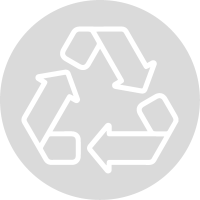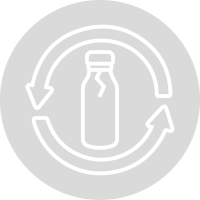the process:
redefining the essence of waste
Glass is a versatile material, yet its recycling remains limited. While food and beverage containers benefit from efficient recycling systems, other types of glass—from industrial and decorative to contaminated glass—are often excluded.
Globally, this results in over 130 million tons of non-recyclable glass waste every year, with Murano alone contributing about 1,000 tons annually. These materials frequently end up in landfills or are downcycled, perpetuating a cycle of wastefulness.
The environmental impact of this is staggering. Sand, the primary component of glass, is the second most exploited raw material on Earth, after water.
Transforming sand into glass consumes vast amounts of energy, often generated through gas combustion, releasing significant CO2 emissions into the atmosphere. Meanwhile, glass factories face high costs for waste transport, analysis, disposal, and purchasing new raw materials, further feeding this unsustainable loop.
our solution
FROM
WASTE
TO
PASTE
At rehub, we have developed a revolutionary, patent-pending process that transforms glass waste into a versatile paste, which we call revéro. This paste embodies the concept of upcycling rather than simple recycling, creating a completely new material—glass reinvented but not the same.
This innovation allows glass waste to be manipulated at room temperature, making the process more flexible and minimizing energy use and environmental impact. The revéro paste can be shaped through common industrial processes such as rolling, moulding, and injection, or even 3D printed using our proprietary extruder technology.


all leftovers generated during the process
can be reintroduced into the cycle,
minimizing waste materials.


THINK LOCAL,
ACT GLOBAL
We started from a local issue, from our land, Murano.
However, the potential of our solution extends far beyond.
By processing glass types that cannot enter traditional recycling streams—such as borosilicate—we offer a complementary recycling chain that reduces waste and minimizes raw material usage. This aligns with the goals of the UN Agenda 2030 for sustainable development.
Our ambition is clear: to scale up this process and industrialize it for global impact. We aim to reduce the world’s glass waste footprint while offering industries a sustainable and innovative alternative to raw materials.





JOIN US
IN DRIVING
THE
CHANGE
At rehub, we are committed to fostering a zero-waste society. We invite partners and investors to join us in scaling up this revolutionary process, ensuring its global implementation. Together, we can transform glass waste into sustainable solutions that honor both innovation and the environment.
Are you ready to be part of this transformation? Let’s get in touch!